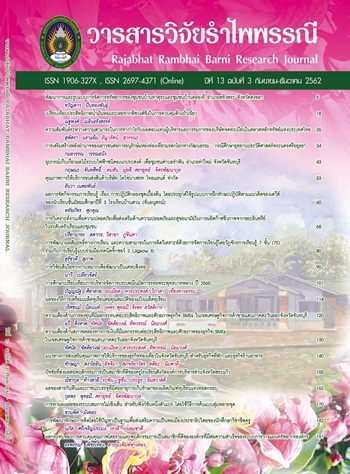Factors Affacting Organizational Citizenship Behavior of Teachers Under Sakaeo Provincial Administrative Organization
Main Article Content
Abstract
The objectives of this study were 1) to study the motivation factors, self-esteem and organizational commitment that affectteachers' good membership behavior in schoolsunder Sakaeo Provincial Administrative Organization, 2) to study the organization citizenship behaviors of teachers under Sakaeo Provincial Administrative Organization, 3) to study the correlation between the factors affecting organization citizenship behaviors and organization citizenship behaviors of teachers under Sakaeo Provincial Administrative Organization, and 4) to create predictive equations of factors that affect teachers' good membership behavior under Sakaeo Provincial Administrative Organization. This research uses a sample size of 180 teachers which was the sample size suggested a table of
Krejcie & Mogan (1970, pp. 607-610) under Sakaeo Provincial Administrative Organization of the academic year 2018. The tools used for collecting data were a rating scale questionnaire of 5 levels which have the item discrimination power between .60-.91 and the reliability of .94. The statistics utilized in analyzing the data were Mean (), Standard Deviation (SD), Pearson’s product moment correlation coefficient, and Stepwise multiple regression analysis.
It was found that the overall and individual aspect of factors affecting organization citizenship behavior and organization citizenship behavior of teachers under Sakaeo Provincial Administrative Organization were rated at high levels. The top three areas of factors affecting organization citizenship behavior and organization citizenship behavior of teachers, were motivation factor, organizational commitment that to affecting organization citizenship and self-esteem. The overall and individual aspect of the organization citizenship behavior of teachers under Sakaeo Provincial Administrative Organization were alse rated at high levels. The top three areas of the organization citizenship behavior of teachers were conscientiousness, civic virtue and courtesy. The correlation between the factors to affecting organization citizenship behavior and organization citizenship behavior of teachers under Sakaeo Provincial Administrative Organization was significantly positive at the .01 level.
The equation, whichconed forcast factors organization citizenship behavior of teachers under Sakaeo Provincial Administrative Organization was
Raw score Ŷ = .313 + .657(Organizational commitment) + .283(Motivation)
Standard score Ẑ = .639 (Organizational commitment) + .229(Motivation)
Article Details
References
2. ณัฏฐพัชร มณีโรจน์. (2557). การศึกษาความสัมพันธ์ระหว่างปัจจัยส่วนบุคคล แรงจูงใจในงานความผูกพันต่อองค์การและพฤติกรรมการเป็นสมาชิกที่ดีขององค์การของบุคลากรสายสนับสนุนวิชาการ มหาวิทยาลัยเกษตรศาสตร์ วิทยาเขตศรีราชา. งานนิพนธ์การศึกษามหาบัณฑิต, สาขาวิชาการบริหารการศึกษา, คณะศึกษาศาสตร์, มหาวิทยาลัยบูรพา.
3. ปาริชาติ ปานสำเนียง. (2555). การศึกษาคุณภาพชีวิตในการทำงานและการรับรู้ความยุติธรรมในองค์กรที่มีอิทธิพลต่อพฤติกรรมการเป็นสมาชิกที่ดีต่อองค์กรผ่านความผูกพันต่อองค์กรของพนักงานมหาวิทยาลัยสายสนับสนุน กรณีศึกษาคณะแพทย์แห่งหนึ่งในกรุงเทพมหานคร. วิทยานิพนธ์การจัดการมหาบัณฑิต สาขาวิชาการจัดการภาครัฐและภาคเอกชน บัณฑิตวิทยาลัย มหาวิทยาลัยศิลปากร.
4. วัลลพ ล้อมตะคุ. (2554). ปัจจัยเชิงสาเหตุที่ส่งผลต่อพฤติกรรมการเป็นสมาชิกที่ดีขององค์การของพนักงานสายปฏิบัติการ มหาวิทยาลัยในกำกับของรัฐ. วิทยานิพนธ์การจัดการมหาบัณฑิต สาขาวิชาเทคโนโลยีการจัดการ คณะการจัดการ มหาวิทยาลัยเทคโนโลยีสุรนารี.
5. เสกสรร อรกุล. (2556). ปัจจัยแรงจูงใจในการปฏิบัติงานที่มีผลต่อประสิทธิภาพในการปฏิบัติงานของพนักงาน บริษัท เมทเทิลคอม จำกัด. วิทยานิพนธ์ปริญญามหาบัณฑิต บัณฑิตวิทยาลัย มหาวิทยาลัยศรีปทุม.
6. Brockner, J. (1988). Self-Esteem at Work. Massachusetts: Lexington Book.
7. Cronbach, L. J. (1990). Essential of physiological testing. New York: Harper Collins.
8. Krejcie, R. V., & Morgan, D.W. (1970). Determining Sample Size for Research Activities.Educational and pychological Measurement, 30(3), pp. 607-610.
9. Morgan, C., & Maureen, T. (1999). “Unrevelling the complexities of Distance Education Student Attrition.” In Distance Education (Vol.2o no. 1): 96-108.
10.Organ, D. W. (1988). Organizational citizenship behaviors: The Goods Soldier Syndrome. Lexington, MA: Lexington.
11. Samuel, C. C., Peter, J. P., & Eddie, A. (2006).Strategic management: Concept and applications. New York: Mc Graw-Hill.


